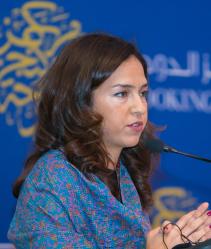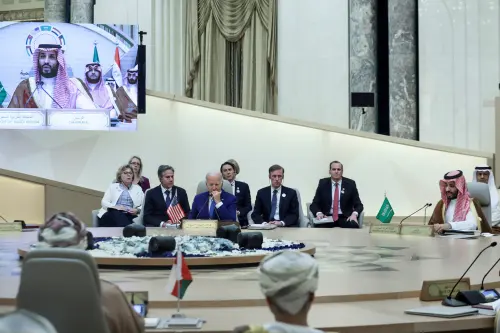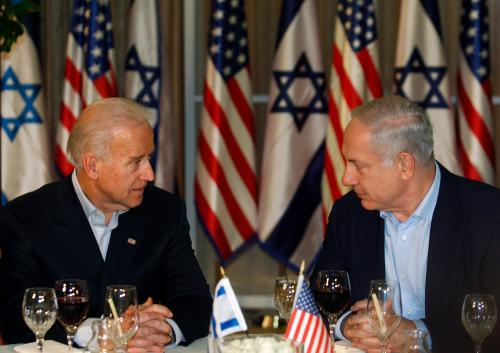Content from the Brookings Doha Center is now archived. In September 2021, after 14 years of impactful partnership, Brookings and the Brookings Doha Center announced that they were ending their affiliation. The Brookings Doha Center is now the Middle East Council on Global Affairs, a separate public policy institution based in Qatar.
On June 5, 2017, the United Arab Emirates (UAE), Saudi Arabia, Egypt, and Bahrain severed their ties with Qatar, beginning a blockade that has had regional and international ramifications. On the first anniversary of the crisis in 2018, Brookings experts published this post. On the second anniversary, they published this post. In light of the recent breakthrough and the signing of the Al-Ula Declaration, they reflect below on the various dimensions, consequences, and outlook for the Gulf crisis.
Tarik Yousef, Senior Fellow in the Global Economy and Development program at Brookings and Director of the Brookings Doha Center (BDC): The announced breakthrough in the GCC crisis at the Al-Ula Summit could not come at a more opportune time for the region. Faced with unprecedented geopolitical and geoeconomic uncertainty, the biggest economic downturn in their modern history, and a public health pandemic that threatens their development model, the feuding countries seem to have recognized the growing political, economic, and security costs of prolonging the crisis. By declaring their intentions to restore diplomatic ties and end the economic blockade, as well as to work through the many difficult outstanding issues, they have raised expectations at home and abroad about the prospects for restoring normalcy to the once vibrant and cohesive GCC.
But in the widely-assumed absence of a written agreement specifying what outcomes will follow and when to expect them, there lies considerable risk for disappointment if progress toward the vaguely stated objectives of the summit declaration is seen as too modest, or if tensions openly resurface over areas of policy disagreement. More importantly, a normalization process that is protracted and incomplete will deprive the GCC countries of significant benefits from the collective action that is required to tackle immediate threats to their security and prosperity. As such, the twin tasks of managing public expectations and pursuing genuine reconciliation are essential prerequisites for achieving a long-term resolution of the crisis.
Omar Rahman—Visiting Fellow, BDC: The agreement to end the blockade of Qatar after three and a half years marks a welcome attempt to turn the page on perhaps the darkest period in the Gulf Cooperation Council’s nearly four-decade-long history. Member states will no doubt benefit greatly from renewed cooperation and coordination at a time when all six face a confluence of economic, political, security, and public health challenges, especially from the COVID-19 pandemic. Mending ties also brings to an end the more costly aspects of the strife, including the economic costs to both sides, as well the enmity engendered through mutual recriminations in the media and in public relations campaigns waged in foreign capitals around the world. Finally, it will allow the GCC’s partners to engage the Arab region without having to navigate its fractured politics.
Nonetheless, the sense of optimism and geniality expressed at the 41st GCC summit does not resolve the underlying sources of tension that prompted the 2017 rift, namely ideological and foreign policy differences separating the sides. These issues led to repeated ruptures in relations prior to 2017, have been exacerbated since 2017, and risk becoming a catalyst for further disputes in the future. Perhaps the desire to prevent another recurrence will keep a lid on a rivalry that has heightened tensions and conflict in the region at large.
Noha Aboueldahab—Fellow in the Foreign Policy program at Brookings and at the BDC: One of the most difficult consequences of the GCC crisis was the damage done to the region’s social fabric. In previous rifts, such as the diplomatic row of 2014, Gulf leaders did not pit their people against their neighbors. But when Bahrain, Egypt, Saudi Arabia, and the UAE imposed an air, land, and sea blockade against Qatar in 2017, all except Egypt ordered their citizens to leave Qatar within two weeks. This resulted in the painful separation of many mixed families. Political tensions and disinformation campaigns exacerbated the sense of betrayal and resentment between family members and Gulf nationals who share an intertwined history.
While the Al-Ula declaration signifies the beginning of a detente, a genuine Gulf reconciliation will require a difficult reckoning with the past. This would serve three primary purposes. First, it would ensure that the grievances of forcibly separated families are not forgotten. Second, it would underscore the shared history and lineages of Gulf nationals. Finally, it would help prevent a future crisis from inflicting the same social and personal harms, which have generated a level of distrust that will take many years to remedy.
Ranj Alaaldin—Visiting Fellow at BDC and Nonresident Fellow at Brookings: The GCC agreement is a major breakthrough that comes as the Biden administration prepares for office and amid an escalation in tensions between the United States and Iran. The GCC will be in the line of fire if a conflict breaks out between the United States and Iran, with the latter having played on divisions in the Gulf to bolster its regional power projection and having capitalized on Qatar’s dependency on its airspace and products.
The end of the crisis addresses at least one of the fault lines within the regional security order that could prevent Iran from continuing to exploit Arab world divisions, and it could have positive reverberations in the areas where GCC countries have engaged in geopolitical competition with one another. But, in the absence of a wider comprehensive settlement that includes other local, regional, and international actors, it is also in these arenas that GCC relations will continue to come under pressure. The international community should not hold its breath: post-Arab Spring political and security landscapes will likely continue to be shaped by way of violent contests and power politics that are bigger than the GCC, and the fate of which will be decided by other actors like the United States, Russia, Turkey, and China.
Adel Abdel Ghafar—Fellow in the Foreign Policy program at Brookings and at the BDC: The breakthrough in the GCC crisis is welcome news, but the geopolitical competition between GCC members and their respective allies in the Eastern Mediterranean is unlikely to end any time soon. Conflicting interests, growing rivalries, and historic tensions in the region have pitted a Turkish-Qatari axis against an Emirati-Greek-Egyptian-French one.
This rivalry has manifested itself not only in Libya, but also across the Mediterranean, where Egypt and Greece have signed a maritime agreement that is in direct opposition to the one signed by Turkey and the Government of National Accord (GNA) in Tripoli. The rivalry has also manifested in rising Turkish-Greek tensions. The MEDUSA joint military exercises held last December between Egypt, Cyprus, Greece, France, and the UAE are arguably directed at Turkey, highlighting how regional tensions could become a source of conflict in the future.
Rather than picking sides, the Biden administration can restrain some of the ambitions of regional actors, including Turkey and the Gulf states. Libya in particular could be an opportunity for the Biden administration to show leadership by supporting the United Nations’ efforts and to indicate U.S. support for a longer-term multilateral solution to the conflict. A stable Libya would make it easier for the new administration to engage Eastern Mediterranean countries over the larger issues of gas exploration and exploitation, as well as decrease regional tensions over Cyprus.
Galip Dalay—Nonresident Fellow, BDC: From the start, Turkey did not regard the Gulf crisis as a bilateral dispute between Qatar and its Gulf-Arab neighbors. Rather, Ankara saw the crisis within the context of the Arab Uprisings and the contest for a new regional order. If the blockade was successful, Turkey believed that the quartet would not only have pushed Qatar out of the regional power game, but also that they would have significantly constrained Turkey’s regional role. For this reason, Turkey supported Qatar unequivocally.
But now, Turkey and the rest of the Middle East and North Africa (MENA) region are preparing for Biden’s presidency. To this end, Turkey is attempting to recalibrate its regional policy and partially mend ties with countries it has had acrimonious relations with in recent years, such as Saudi Arabia, Egypt, and Israel. In recent months, there have been some positive signs, particularly in Turkish-Saudi relations. In contrast, Turkish-Iranian relations are souring and set to become more tense in the coming period, as the sites of their rivalries extend to new places, such as the South Caucasus.
Despite the breakthrough, we should not forget that the improvement in Saudi-Qatari ties has not occurred as a result of a convergence in their regional policies or visions. Rather, it is necessitated by the coming of the Biden administration. All the political and geopolitical issues that contaminated their relations in the first place remain present today. As such, this improvement in ties between Doha and Riyadh should not be seen as resolving their disputes, but rather as managing them. The same will also be the case for any prospective improvement in Turkish-Saudi ties.
Yasmina Abouzzohour—Visiting Fellow, BDC: All Maghreb states will view the resolution of the Gulf crisis in a positive light, but Morocco is the biggest winner. While the kingdom officially maintained a neutral stance throughout the crisis, it arguably favored Qatar, sending supplies and refusing to bow to pressures from blockading countries to turn on Doha. Even after the resolution, the Qatari leadership will remember the Moroccan regime’s loyalty and will continue to provide financial and diplomatic support. Although Morocco’s relationship with the Saudi-Emirati bloc was more tense, relations between Rabat and Abu Dhabi have been more cordial following Morocco’s partial normalization with Israel. Going forward, to promote its economic and diplomatic interests, Morocco will aim to maintain this relationship and will attempt a further rapprochement with Saudi Arabia. This policy is motivated by the kingdom’s aim of countering potential Algerian influence in the Gulf.
Algeria has generally been more isolationist than its rival Morocco and more wary of external intervention, due to its experiences with French colonialism and the 1990s civil war. It will continue to view Gulf involvement in the Maghreb (and especially in Libya) as destabilizing and threatening to its own security. However, given its exacerbated economic conditions, ongoing internal political tensions, and refusal to seek aid from international organizations, it may become more open to a rapprochement with the GCC. At the very least, it will aim to attract further Gulf investment as it seeks to diversify its economy away from hydrocarbons.
Robert P. Beschel Jr.—Nonresident Senior Fellow, BDC: The GCC has not been hit as hard as Europe, Latin America, and the United States by the COVID-19 pandemic, yet it remains a potent threat. A number of GCC countries are experiencing significant second waves of infection, with certain communities, such as migrant workers, being particularly at risk.
The ending of the blockade of Qatar will exacerbate risks due to increased travel and contact, but it will also provide an important opportunity to reinvigorate cross-border collaboration—and few domains are better suited for it than the “win-win” field of public health. Important near-term priorities would include joint surveillance and the real-time sharing of data on COVID-19 mortality and morbidity; improved information sharing and coordination on policy and institutional responses to the virus; and obtaining greater efficiencies in the procurement of personal protective equipment and the ramping up of testing capacity. Coordination in the procurement and distribution of vaccines could save costs and improve outcomes for both the GCC countries and their neighbors, such as Iraq and Yemen. Beyond the immediate ravages of COVID-19, there is room for improved collaboration on a host of other health priorities. In a period of fiscal stringency, GCC countries could also usefully collaborate in improving primary healthcare and reducing healthcare expenditure, including costly treatments abroad, through greater specialization.
Nader Kabbani—Senior Fellow in the Global Economy and Development program at Brookings and Director of Research at the BDC: The Al-Ula declaration promises to normalize diplomatic and commercial relations between Qatar and the blockading countries of Saudi Arabia, Bahrain, the UAE, and Egypt, after three and a half long years. On the economic front, the immediate benefit will be the opening of airspace and a return of travel and trade via air, sea, and land routes. This is a welcome development that can help increase economic activity as GCC countries begin lifting COVID restrictions and revving up economic activity.
However, even though the declaration calls for GCC states to unify their markets, it is unlikely that they will return to the high levels of economic integration that existed before the blockade. Since 2017, Qatar has established a network of alternative supply routes and homegrown substitutes for the products and services it used to import from its neighbors. Nor are cross-border investments likely to return to pre-blockade levels, as it will take many years to rebuild the necessary levels of trust. And yet, the global pandemic has reduced financial revenues, placing pressure on Gulf states to redouble their efforts to diversify their economies and improve regional economic integration. This can be achieved through more balanced trade between Qatar and its neighbors than existed in the past.
The Brookings Institution is committed to quality, independence, and impact.
We are supported by a diverse array of funders. In line with our values and policies, each Brookings publication represents the sole views of its author(s).











Commentary
Op-edWhat Brookings experts are saying about the breakthrough in the Gulf crisis
January 10, 2021